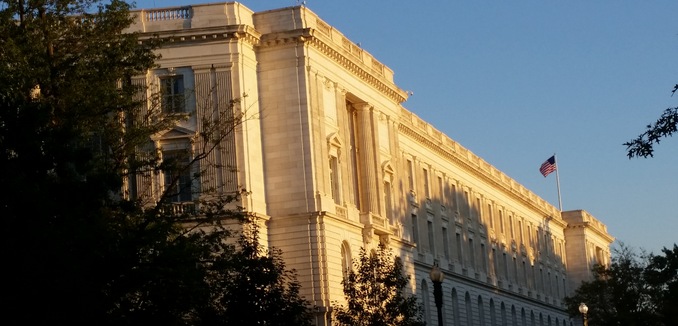Many of the senators who support the nuclear deal with Iran, and who voted Thursday to filibuster and prevent an up-or-down vote, have made strong cases against the deal they advocate for, Mitchell Bard, executive director of the American-Israeli Cooperative Enterprise, observed in The Times of Israel Thursday.
Sen. Richard Blumenthal (D-Conn.) said on Tuesday that the final deal “is not the agreement I would have accepted at the negotiating table.” Bard observed that Blumenthal is working with Sen. Ben Cardin (D – Md.), who opposed the deal, to introduce legislation that will address “shortfalls, unwanted impacts and consequences revealed during congressional review of the agreement.” Notably, Blumenthal wants legislation to “provide for effective ‘snap-back’ policies regarding sanctions.” The “snap-back” policies are the key enforcement mechanism in the deal.
Sen. Gary Peters (D – Mich.) objected to America’s departure from its longstanding demand of not allowing Iran to enrich uranium.
My core concern with this agreement lies with the basic issue that has always been before us — the enrichment of uranium by Iran. This deal allows Iran, under the same leadership that refers to the United States as the Great Satan and calls for the destruction of Israel, to enrich uranium on its own soil. This core concession is in many ways a stark departure from our country’s past non-proliferation policies, and it concerns me that this agreement could set a dangerous precedent as developing nations around the world look to nuclear power to meet their growing domestic demands for energy and electricity… How can the United States say with moral authority that this deal is acceptable for Iran, the world’s leading state sponsor of terrorism intent on regional hegemony, but deny it to others?… I am concerned that other nations will view this agreement with Iran as a change in U.S. policy and new precedent that may lead to increased global proliferation of nuclear enrichment and the potential for other nuclear threshold states to emerge.
Peters observed that this would lead to Iran becoming “a legitimized threshold nuclear state” in 15 years. Bard also noted Peters’ concern about Iran’s support of terrorism, which “will further destabilize an already fragile region” after an infusion of billions of dollars from the deal.
Sen. Chris Coons (D – Del.), like Peters, expressed his concern about Iran being allowed to develop an industrial nuclear program, which would be very difficult to contain if Iran cheats:
Even if the Iranians comply with the letter and spirit of the agreement as negotiators for the United States understand it, a stronger, financially stable, and economically interconnected Iran will develop an expanded nuclear enrichment program after a decade which — if it then chooses to violate the agreement — would allow it to quickly develop enough fissile material for a nuclear weapon. This agreement — at best — freezes Iran’s nuclear enrichment program — it does not dismantle or destroy it as I hoped it would.
Like Blumenthal, Sen. Michael Bennet (D – Colo.) will be working with Cardin to develop legislation “to address the accumulated shortcomings of our policies towards Iran, and to strengthen the agreement.” He said that “there are risks to the successful implementation of this agreement, and the President and Congress must now work to make it stronger.”
Sen. Cory Booker (D – N.J.) objected to Iran getting away with more than ten years of cheating:
This deal has clear flaws and substantial risks even beyond the obvious and disturbing short duration of its term. With this deal, we are legitimizing a vast and expanding nuclear program in Iran. We are in effect rewarding years of their deception, deceit, and wanton disregard for international law by allowing them to potentially have a domestic nuclear enrichment program at levels beyond what is necessary for a peaceful civil nuclear program.
Sen. Kirsten Gillibrand (D – N.Y.) was bothered by the inspections regime and the lifting of the arms embargoes against Iran:
I would have liked to see a period shorter than 24 days to resolve disputes over access for inspectors. The UN embargoes on the sales of arms and ballistic weapons to Iran should have remained in place permanently, instead of lapsing after five and eight years.
Sen. Ron Wyden (D – Ore.), similar to others, wrote that “this agreement with the duplicitous and untrustworthy Iranian regime falls short of what I had envisioned,” and specifically raised concerns about the secret “side deals” between Iran and the International Atomic Energy Agency.
Bard noted similar objections raised by Senators Chris Murphy (D – Conn.), Debbie Stabenow (D – Mich.), Tim Kaine (D – Va.), Michael Bennet (D – Colo.) and Jeff Merkley (D – Ore.), all of whom supported the deal.
These senators generally state that the deal is not one that they would have negotiated, forgives Iran’s past nuclear transgressions, fails to address its destabilizing behavior, allows it to develop an industrial nuclear program, has an insufficient inspections regime, fails to address Iran’s past nuclear work adequately, and has an enforcement mechanism that needs strengthening.
“Given all these anxieties,” Bard asked, “how can these senators support the Iran agreement? Every one of them echoed the concerns of the deal’s opponents, which only confirms that this is a very bad deal.”
The senators’ concerns show that their view of the deal is much different from that of President Barack Obama, who said last month at American University that he has “had to make a lot of tough calls as President, but whether or not this deal is good for American security is not one of those calls. It’s not even close.”
[Photo: soccerdhg / Flickr ]




